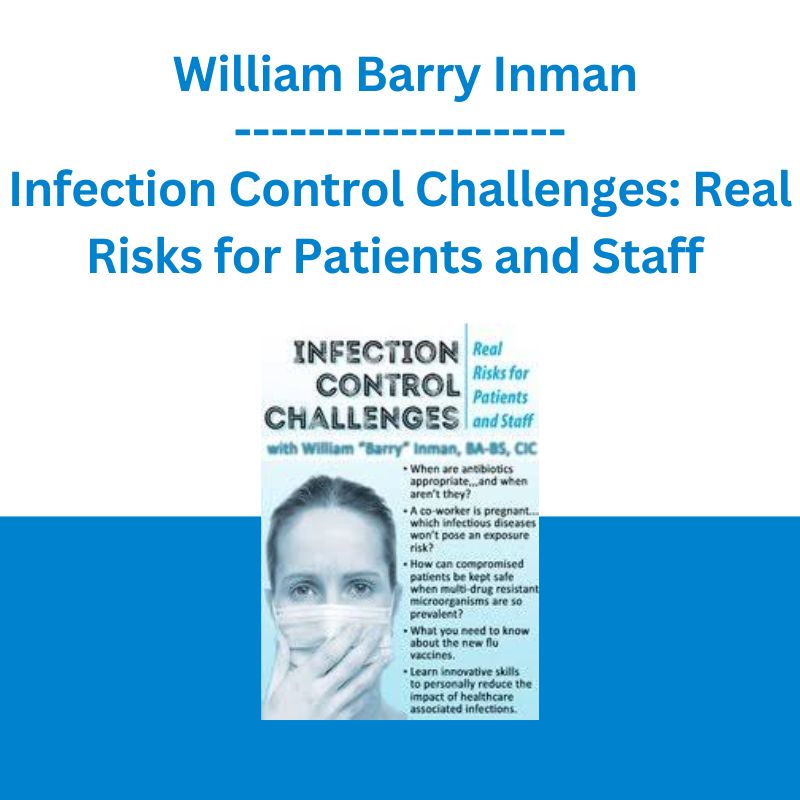*** Proof of Product ***
Exploring the Essential Features of “Infection Control Challenges: Real Risks for Patients and Staff – William Barry Inman”
Barry Inman, BA-BS, CIC, will share practical solutions to a variety of “what if” infectious disease scenarios that healthcare professionals confront routinely. So many questions can and do arise when it comes to the safety and health of your patients, yourself…and even your family! Are your confident in your responses…
- One patient with an ileal conduit urinary system that, when cultured, revealed microorganisms. Should the treatment include antibiotics…or not?
- A co-worker is pregnant…which patient rooms won’t pose a potential risk?
- What innovative skills can you personally incorporate to reduce the incidence of healthcare-associated infections?
- How can compromised patients be kept safe when multi-drug resistant microorganisms are so prevalent?
- You’ve been providing great patient care all shift. Now it’s time to head home. How do you make that transition and not introduce your family to some of the infectious diseases you’ve been around?
- A disease that may be in a distant part of the world could find its way to our backyard! These emerging cases are often complicated in practice. Are you up-to-date to intervene effectively?
Speaker
William Barry Inman, BA-BS, CIC
William “Barry” Inman has 40 years of experience as an epidemiologist, working for a busy health department in Florida. In his current role, Barry is responsible for control of communicable diseases through surveillance and investigation methods, working directly with the infection control personnel in hospitals, long-term care, acute long-term care, and NASA. He advises concerning appropriate precautions/management strategies and assists infectious disease physicians in the diagnosis of uncommon or exotic diseases by working as a liaison between the Department of Health in Florida and the CDC.
Barry has vast experience in outbreak mitigation and prevention, whether within a healthcare facility, in the community or on a cruise ship. His expertise has been sought for a variety of outbreaks, including: rubella, influenza, legionnaire’s disease, measles, pertussis, norovirus and multi-drug resistant microorganism (MRSA, CRE, ESBL). Numerous awards have been bestowed upon Barry for his contributions to minimize the effects of constantly evolving infectious diseases.
Speaker Disclosures:
Financial: William “Barry” Inman has employment relationships with Brevard County Health Department, Circles of Care, Brevard Community College, Circles of Care, and Health First Inc. He receives a speaking honorarium and recording royalties from PESI, Inc. He has no relevant financial relationships with ineligible organizations.
Non-financial: William “Barry” Inman is a member of the Association of Practitioners of Infection Control, the Association of Practitioners of Infection Control Local Chapter 45, and the Florida Practitioners of Infection Control.
Objectives
- Plan strategies to reduce and eliminate catheter-associated urinary tract infections, surgical site infections, ventilator associated and non-ventilator-associated pneumonias and central-line-associated bloodstream infections.
- Assess best practices for treatment and control of multi-drug resistant microorganisms, including MRSA, Clostridium difficile, VRE, ESBL and CRE.
- Evaluate the newest vaccine recommendations for healthcare workers and children.
- Distinguish between mosquito-borne illnesses of Dengue, Chikungunya, and Zika, which may be a threat to the United States.
- Assess the latest treatments available for HIV/AIDS, as well as pre-exposure prophylaxis.
- Determine the medications available that “cure” Hepatitis C.
- Evaluate the current recommendations to control and treat tuberculosis.
Outline
A Summary of Current Recommendations From the CDC, SHEA, IDSA, APIC and the Joint Commission
Health-Care Associated Infections: Strategies to Control-Reduce-Eliminate
- Catheter-Associated Urinary Tract Infections
- Surgical Site Infections
- Ventilator-Associated Pneumonias
- Non-ventilator Associated Infections (overlooked HAI)
- Central-Line Associated Bloodstream Infections
The Latest Multi-Drug Resistant Microorganism Guidelines
- Carbapenem-resistant enterobacteriaceae
- Clostridium difficile
- Methicillin-resistant staphylococcus aureus
- Vancomycin resistant enterococcus
- Acinetobacter baumannii
Influenza
- Avian vs. swine vs. seasonal influenza
- H1N1 pandemic results
When to treat? When not to treat?
Treatment with anti-virals and antibiotics
New vaccines for flu
Vaccination Recommendations for Healthcare Personnel
- Zoster/shingles
- Pneumoccocal
- MMR, Tdap, etc.
Emerging Infectious Diseases (Zoonotic)
- Ebola: What we learned
Mosquito-borne (“Zika”, Dengue, Chickungunya, West Nile)
Tick-borne (Lyme and Babesia)
Cryptosporidiosis
Bloodborne Pathogens
- Hepatitis B
Vaccination protocol for healthcare personnel
Staff follow-up after significant exposures
Treatments for persons chronically infected
Outbreaks in healthcare - Hepatitis C
Treatment “cures” in 12-24 weeks
Outbreaks in healthcare-dialysis settings - HIV/AIDS
New one pill daily treatment
Healthcare exposure and appropriate prophylaxis
Tuberculosis
- Today’s best approaches to treatment
- Skin testing vs. blood test for exposure
- Follow-up guidelines for healthcare workers conversion testing
Target Audience
- Nurses
- Infection Preventionists
- Nurse Practitioners
- Clinical Nurse Specialists
- Nurse Educators
Please see the full list of alternative group-buy courses available here: https://lunacourse.com/shop/









